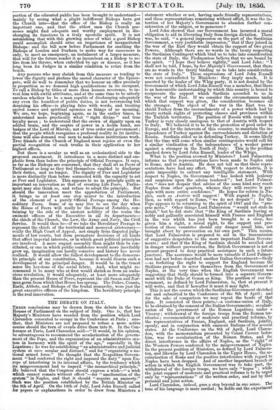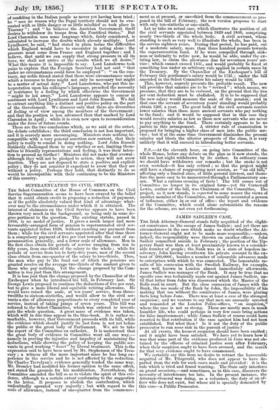11:1E DEBATE ON ITALY.
. THREE conclusions may be drawn from the debate in the two Houses of Parliament on the subject of Italy. One is, that her Majesty's Ministers have receded from the position which Lord Clarendon consented to occupy in the Conference at Paris ; ano- ther, that Ministers are not prepared to refuse a more active course should the turn of events drive them into it. In the Con- ference at Paris, Lord Clarendon said—" It would, in his opinion, be advantageous to recommend the secularization of the govern- ment of the Pope, and the organization of an administrative sys- tems in harmony with the spirit of the age," especially in the Legations; he was for establishing "an administrative and judicial system at once secular and distinct," and for "organizing a na- tional armed force." He thought that the Neapolitan Govern- ment "had conferred the right and imposed the duty" upon Eu- rope of interfering in its internal affairs, by the tendency which its misgovernment had to imperil "the monarchical principle." Be believed that the Congress should express a wish—" a wish which cannot remain without effect "—for "amelioration of the system" in Naples, and that it should "require an amnesty." Such was the position established by the British Minister on the 8th of April. On the 14th of July, Lord John Russell called for papers or explanations in order to draw from Ministers a
statement whether or not, having made friendly representations, and those,representations remaining without effect, it was the in- tention of her Majesty's Government to abandon further con- sideration of the subject, or to persevere?
Lord John showed that our Government has incurred a moral obligation to aid in liberating Italy from foreign dictation. There was, he said, "a general impression on. the part of the Sardinian Government, a very justifiable impression," that if they joined in the war of the East they would obtain the support of two great Powers. Although there are no words in the treaty respecting the Sardinian Contingent which bind us to take into consideration the state of Italy, the Piedmontese believe that we are bound by the spirit. "I hope they believe rightly," said Lord John: " I shall not be told, I hope, by her Majesty's Government, that there are no words in the treaty binding Us to take into consideration the state of Italy." These expressions of Lard John Russell were not contradicted by Ministers: they imply much. It is asserted by the leader of the Whig party, it is not denied by the Government of which Lord John Russell was a member, that there is an honourable understanding by which this country is bound to reciprocate the support which Sardinia accorded to us in the war of the East. If we consider the circumstances under which that support was given, the consideration becomes all the stronger. The object of the war in the East was to shield Turkey from the encroachments of a power which had by treaty certain rights of protecting classes an41 provinces within the Turkish territories. The position of Russia with respect to Turkey is very closely analogous to that of Austria with respect to Italy, We believed it to be for the protection of good order in Europe, and for the interests of this country, to maintain the in- dependence of Turkey against the encroachments and dictation of Russia. Sardinia aided us in defending Turkey. It seems likely that the time will come when shwas r contingencies would call, for a similar vindication of the independence of a weaker power against a stronger in the North of Italy. This is the position marked down by Lord John Russell, leader of the Whigs. What is the position avowed by Ministers? Lord Palmerston informs us that representations have been made to Naples and to Rome, and to Austria. He does not tell us that these repre- sentations have had any effect. With respect to Austria, it is quite impossible to extract any intelligible statement. With respect to Naples, its Government "has looked with jealousy and suspicion upon the advice tendered" ; but Lord Palmer- ston "does not despair that advice of the same kind may reach Naples from other quarters, whence they will receive it per- haps with more entire confidence." He hopes for reform in Na- ples, such as Austria will suggest ! With regard to Naples, then, as with regard to Rome, we do not despair " ; for the Pope appears to be returning to the spirit of 1847 and the " pro- prio inotu." Other things Lord Palmerston "would not state in detail," but he did state that "the King of Sardinia having so nobly and gallantly associated himself with France and England in the war which has just been brought to a close, has given him a right, a moral right, to the support and pro- tection of those countries should any danger assail him, not brought about by provocation on his own part." Thia means, that Lord Palmerston is prepared to aid in the transmission of suggestive despatches to the more important Italian Govern- ments; and that if the King of Sardinia should be assailed and in danger without provocation the British Government is not at present prepared to deny practical assistance in such a future juncture. The assurance would be more valuable if Lord Palmer- ston had not before described another Italian Goverfunent—Sicily —as forfeiting the right to support for England because the Sicilians proposed to sever themselves from the Government of Naples at the very time when the English Government was suggesting that Sicily should be formed into a separate Govern- ment with the Duke of Genoa as King. The position of our Go- verzunent, as defined by Lord Palmerston, is, that at present it will write, and that if hereafter it must it may fight. This is not the course whieh the Sardinian Government sketched out and, submitted to the Conference of the 8th of .April; and for the sake of comparison we may repeat the heads of that plan. It consisted of these points —a customs-union of Italy, to be obtained, by the consent of the &Ilan Governments; seculari- zation of the government of the Roman Legations under a Viceroy; withdrawal of the foreign troops from the Roman ter- ritories; recommendation of moderate and practical reforms, by the representatives of France, England, and Sardinia, jointly, openly, and in conjunction with eminent Italians of the several states. At the Conference on the 8th of April, Lord Claren- don, with the memorandum presented by Count Cavour before him, was for secularization of the Roman States, and for direct interference in the affairs of Naples, is the "right" of the Western Powers conferred by the misgovernment of Naples. In the present position of Ministers, as defined by Lord Palmers- ton, and likewise by Lord Clarendon in the Upper House, the se- cularization of Rome and the positive interference with regard to, Naples have been dropped. And of another important branch of action in which the English Government was to take part, the withdrawal of the foreign troops, we have only " hopes " ; while the joint support of moderate and practical reforms is to be urged only by " representations " of the written order, and not by that personal and joint action.
Lord Clarendon, indeed, goes a step beyond in one sense. The tone of his language is more cordial; he holds out the experiment of confiding in the Italian people as never yet having been tried ; he "sees no reason why the Papal territory should not be eva- cuated with as little danger or as little mischief as took place in Tuscany " ; and "he believes the Austrian Government itself desires to withdraw its troops from the Pontifical States." But Lord Clarendon uses some language which, fairly considered, is calculated to increase the doubts which already multiply. Lord Lyndhurst, he said, "had stated in plain terms the difficulties which England would have to encounter in acting alone : the pressure must come from France and England together ; and I believe, that until we can, supply that strong- pressure in all its force, we shall not arrive at the results which we all desire." What this means it is impossible to say. Lord Lansdowne took pains to explain that the Foreign Secretary had not said "that under no cuouinstances could force be employed " : "on the con- trary, my noble friend stated that there were circumstances under which a recourse to force might not only be necessary but inight be a matter of actual duty." Lord Lansdowne, who put this in-
terpretation upon his colleague's , preached the necessity of resistance to a feeling by which otherwise the government "might be led away." Lord Lansdowne appears to concur in sentiment with Lord Lyndhurst and Lord John Russell. We fail to extract anything like a distinct and positive policy on the part of the Government. We discover only that there are diversities of feeling or of view among the members of the Government ; and that the position is less advanced than that marked by Lord. Clarendon in April; while it is even now open to reconsideration under the force of future events.
These are the two conclusions which, as we said at the outset, the debate establishes ;'the third conclusion is not less important, and it is scarcely more encouraging. Ministers state nothing in- compatible with a very general assertion now current, that their policy is really to consist in doing nothing. Lord John Russell distinctly eh ftenged them to say whether or not, limiting them- selves to friendly representations and feeling, it was their inten- tion to proceed no further? Ministers did not make that avowal : although they will not be pledged to action, they will not avow inaction. They are not disposed to state a positive and explicit policy ; they do not consider it expedient to avow that they are without a policy. Perhaps they hold, that distinctly to do so would be incompatible with their continuing to be the Ministers of this country.



























 Previous page
Previous page